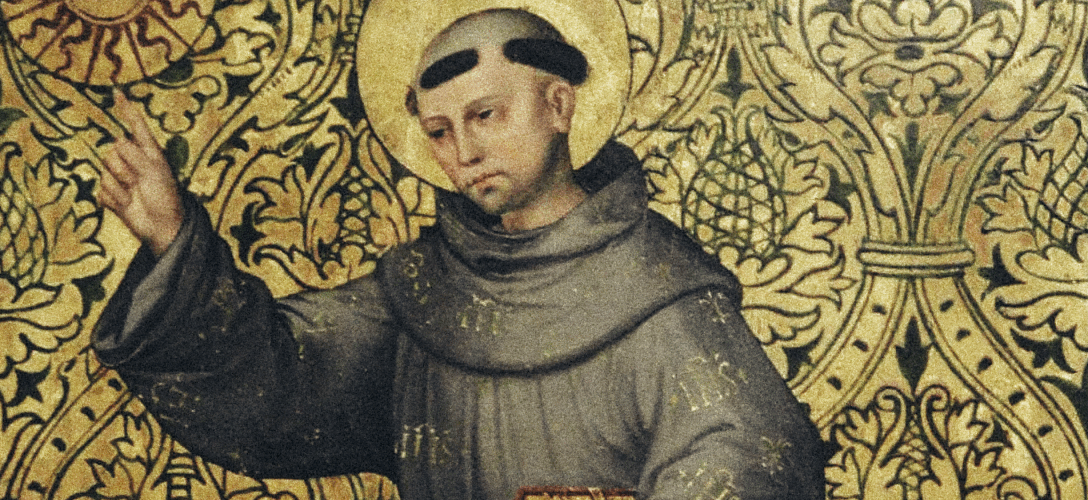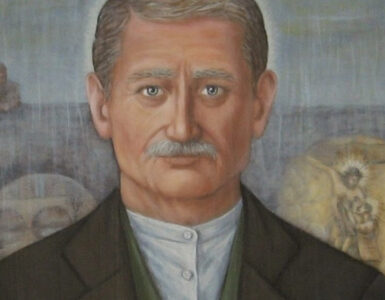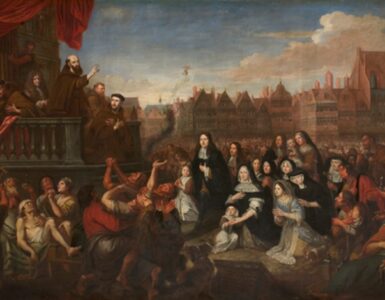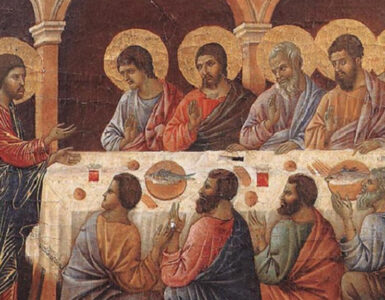This is the most apt way of describing the great Franciscan saint, St Bernardine of Siena, whose feast day we celebrated on Tuesday 20 May 2025.
In his address to a group of pilgrims from Siena on Saturday, 15 March 1997, Pope St John Paul II told them that Christ’s monogram: Jesus, true God and true man, the Saviour, should be at the centre of all true human relationships. The monogram of Christ brought by the great St Bernardine as a sign of peace stands out on the town hall of Siena and on almost all the houses in your land: Jesus, true God and true man, the Saviour. May it not be a mere archaeological piece! Christ is always the same yesterday, today and for ever. Make room for Christ in your personal, family, social and professional lives. His presence is a guarantee of richer and more authentic human relationships (no.3).
This great Franciscan brother was born into a noble family in Massa Marittima, in the Province of Siena, Italy. Unfortunately he had to suffer alot since his childhood. In fact, he was orphaned before age seven and lived with his aunt. Since the latter was a devout Catholic her compelling example really helped him grow in virtue. Moreover, Bernadine also grew in love for the poor. As his life story would tell us, he frequently gave his food away and never ever let a beggar hungry.
As a student of civil and canon law in Siena, the young Bernadine was very adamant in fasting every Saturday in honor of the Blessed Virgin Mary and taking part solely in edifying conversations. When at the age of seventeen, Bernardine joined the Confraternity of Our Lady, he had the grace, together with its members, to assist at a local hospital that cared for the sick, orphans, poor, and pilgrims. Bernadine’s heroic love for the sick could be seen three years later when a terrible plague hit Siena, thus eliminating countless people, including many hospital workers. In front of this human catastrophe, Bernardine rolled up his sleeves and, together with twelve young men who ran the hospital, cared for the sick day and night. Although he fell ill and remained stuck to a bed for four months, Bernardine was wise enough to use that time to deepen his prayer life. As soon as he recovered, Bernardine immediately cared for a blind and bedridden aunt until her death.
When he was twenty-two years of age, Bernardine came to realize that God was calling him to join the Franciscan Friars of the Strict Observance. His life story notes that he regularly went beyond the normal disciplines of the order, joyfully imposing upon himself severe penances and indulging himself in prayer. He was ordained a priest on his birthday, namely, the Feast of the Nativity of the Blessed Virgin Mary in 1404.
Father Bernardine’s sole motivation was the salvation of souls. Although he longed to preach he had to contend with a speech impediment. However, thanks to prayer, Bernardine came to realize that preaching is not a matter of having an eloquent or strong voice. Peaching primarily depends upon God’s interior presence. Over the next thirty-plus years which he spent as preacher, Father Bernardine’s faith and charity singled him out as a beloved preacher. Animated by an outstanding apostolic zeal, Bernardine traveled on foot from town to town, all over Italy. When the churches were too small to contain the crowds, he preached in the public squares instead. Father Bernardine not only preached Christ’s words but, and most of all, he preached Christ Himself who made his dwelling in Him. Due to his holy life, a few words from his mouth had the power of producing much more good fruit than other friars’ hours of sermons. The First Letter to the Corinthians explains it all: We preach Christ crucified, a stumbling block to Jews and folly to Gentiles, but to those who are called, both Jews and Greeks, Christ the power of God and the wisdom of God. For the foolishness of God is wiser than men, and the weakness of God is stronger than men (1 Cor 1:23-25).
The content of St Bernardine’s preaching was very much down-to-earth. In fact, he preached against materialism, sexual immorality, indecent conversations, as well as gambling. Frequently, Bernardine would gather immoral items, such as cards, immodest clothing, dice, and perfumes, and burn them in the public square in a “bonfire of vanities.” Bernardine was not only wise in denouncing all these evil deeds and inclinations but also was wise to suggest a solution. He ferventlypromoted devotion to the Holy Name of Jesus through the symbol “IHS,” the first three letters of Jesus’ name in Greek. St Bernardine was truly a beloved son of St Francis since thanks to his preaching, individuals got reconciled, and entire cities finished their long wars and conflicts with each other. Miraculous prophecies and healings sustained his preaching. It is said that Bernardine raised four people from the dead.
Like St Paul, Bernardine was falsely accused of heretical teaching. After his trial in Rome, the Pope not only declared him innocent but also blessed him to keep spreading God’s word and called him a second Paul. Later, Bernadine was appointed Vicar General of his order, and for five consecutive years he worked tirelessly at reform. For the last two years of his life, he spent them travelling, preaching, and saving many souls. Six years after his death, in 1450, he was canonized a saint.
The great preacher encourages us to love the name of Jesus. Yes, the name of Jesus is the glory of preachers. It is our very salvation! In Sermon 49, of De glorioso Nomine Iesu Christi, cap 2, St Bernardine says:
The name of Jesus is the glory of preachers, because the shining splendor of that name causes his word to be proclaimed and heard. And how do you think such an immense, sudden and dazzling light of faith came into the world, if not because Jesus was preached? Was it not through the brilliance and sweet savor of this name that God called us into his marvelous light? When we have been enlightened, and in that same light behold the light of heaven, rightly may the apostle Paul say to us: Once you were darkness, but now you are light in the Lord; walk as children of light.
So this name must be proclaimed, that it may shine out and never be suppressed. But it must not be preached by someone with sullied mind or unclean lips, but stored up and poured out from a chosen vessel. That is why our Lord said of Saint Paul: He is a chosen instrument of mine, the vessel of my choice, to carry my name before the Gentiles and kings and the sons of Israel. In this chosen vessel there was to be a drink more pleasing than earth ever knew, offered to all mankind for a price they could pay, so that they would be drawn to taste of it. Poured into other chosen vessels, it would grow and radiate splendor. For our Lord said: He is to Carry my name.
When a fire is lit to clear a field, it burns off all the dry and useless weeds and thorns. When the sun rises and darkness is dispelled, robbers, night-prowlers and burglars hide away. So when Paul’s voice was raised to preach the Gospel to the nations, like a great clap of thunder in the sky, his preaching was a blazing fire carrying all before it. It was the sun rising in full glory. Infidelity was consumed by it, false beliefs fled away, and the truth appeared like a great candle lighting the whole world with its brilliant flame.
By word of mouth, by letters, by miracles and by the example of his own life, Saint Paul bore the name of Jesus wherever he went. He praised the name of Jesus at all times, but never more than when bearing witness to his faith. Moreover, the Apostle did indeed carry this name before the Gentiles and kings and the sons of Israel as a light to enlighten all nations. And this was his cry wherever he journeyed: The night is passing away, the day is at hand. Let us then cast off the works of darkness and put on the armor of light; let us conduct ourselves honorably as in the day. Paul himself showed forth the burning and shining light set upon a candlestick, everywhere proclaiming Jesus, and him crucified.
And so the Church, the bride of Christ strengthened by his testimony, rejoices with the psalmist, singing: 0 God, from my youth you have taught me, and I still proclaim your wondrous deeds. The psalmist exhorts her to do this, as he says: Sing to the Lord, and bless his name, proclaim his salvation day after day. And this salvation is Jesus, her savior.
How right is St Paul when, in his Letter to the Philippians, he says: Therefore God has highly exalted him and bestowed on him the name which is above every name, that at the name of Jesus every knee should bow, in heaven and on earth and under the earth, and every tongue confess that Jesus Christ is Lord, to the glory of God the Father (Phil 2:9-11).






























